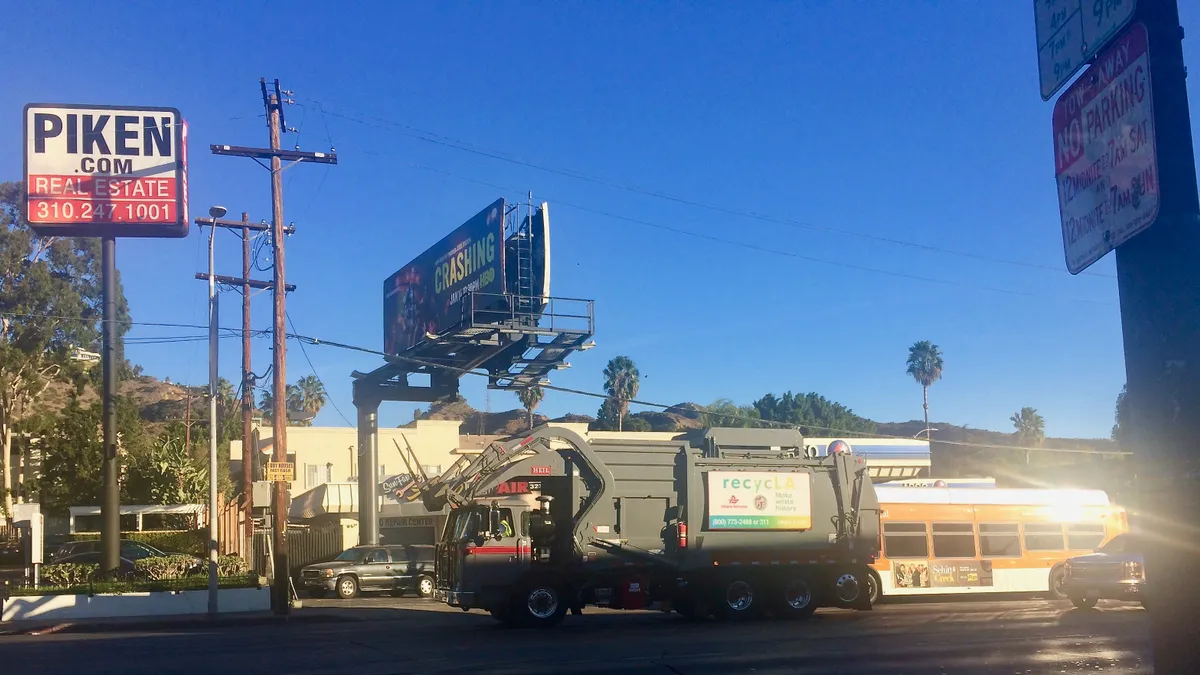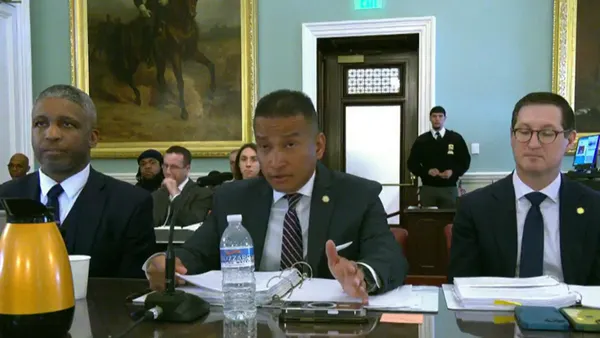Dive Brief:
- The Los Angeles City Council's environmental committee recently held its first hearing in nine months on the RecycLA franchise program, featuring the same frustrations from property owners over higher costs and logistical challenges that have been pervasive since it launched. New data indicates the program now includes 65,565 customers.
- Service providers have paid $25,000 to date in fines related to contract performance, although some council members questioned whether that was enough. According to the Los Angeles Bureau of Sanitation (LASAN), the seven companies are estimated to pull in $436 million this year — including $36 million in franchise fees for the city.
- LASAN Director Enrique Zaldivar also discussed how the city is exploring new North American recycling market options, including a potential partnership with Baja, Mexico. “We can no longer only rely on China," he said. "Whether they restore and reopen the markets, which everybody is saying they will, we are developing alternative markets."
Dive Insight:
Since launching in 2017, with full transition completed earlier this year, the RecycLA franchise program has been one of the most watched in the industry. Seven service providers — Waste Management, Republic Services and Athens Services the largest among them — now have lucrative contracts for 10 years with options to extend up to 20. Significant issues with missed collections and rate spikes spurred ongoing media attention in the beginning, which led to a much longer and more acrimonious council hearing in February.
While missed pick-ups have largely been resolved since fines kicked in, pricing concerns — including both higher base rates and the addition of service fees for steps such as unlocking gates or moving containers — have not. Some customers trying to avoid these fees by leaving their containers in open areas say they have experienced illegal dumping or other issues.
LASAN presented new data showing service fees contribute to 13% of total charges for commercial accounts and 30% for multi-family accounts. Negotiations are ongoing with service providers to possibly revise this fee structure. The city has also established a billing task force to help resolve potential disputes, but no data is available on the results.
While the hearing did feature discussion on ways to ameliorate costs for specific categories — such as affordable housing complexes, nonprofits, mobile home parks and equestrian sites — the bottom line is that RecycLA has driven up the cost of doing business in Los Angeles. Still, many believe it was artificially low to begin with at the expense of environmental and labor standards.
As Waste Dive explored in a recent feature, the program's backers and contracted service providers believe the environmental and efficiency gains will justify costs in the long run. The challenge is it's still too early to see significant results, as many of the program's foundational systems will take years to come to fruition. China's scrap import policies, which kicked in shortly after the program's launch, have also complicated matters.
Service providers reportedly collected 11,677 tons of recyclables in August, and have rescued or diverted 1,621 tons of food to date. However, participation remains a challenge, and planned infrastructure to boost both areas is still under construction. A recently approved facility certification plan that requires infrastructure to meet high standards sets final implementation targets well into the next decade. While fleet emissions have already improved thanks to 469 new clean fuel vehicles now on the streets, LASAN doesn't currently know whether vehicle miles traveled have decreased as a result of the program.
Some of these challenges are a function of the program being more complicated than expected, but some are also inevitable in any transition of this magnitude. New York is now next in line for its own nonexclusive franchise proposal, and the city has already factored in some lessons from Los Angeles. RecycLA can be expected to keep coming up as an example to suit the argument of various parties, but this latest council hearing is further evidence that it's still too soon to draw full conclusions about the program's success.














